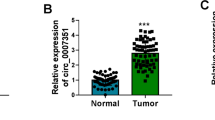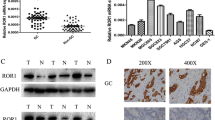Abstract
The G protein-coupled receptors (GPRs) have been shown to regulate several cancer related processes. The aberrant expression of GPRs has been linked to the development of several cancers. The present study was designed to examine the expression and decipher the role of GPR15 in the development of human colorectal cancer. The results revealed GPR15 to be significantly (P < 0.05) upregulated in colorectal cancer cells. The silencing of GPR15 inhibited the growth of the colorectal cancer cells via induction of apoptosis. Induction of apoptosis in colorectal cancer cells was associated increase in Bax and decrease in Bcl-2 expression. The silencing of GPR-15 also caused a significant (P < 0.05) decline in the migration and invasion of the colorectal cancer cells. Bioinformatic analysis and luciferase assay revealed that the expression of GPR15 to be post-transcriptionally regulated by microRNA-1225 (miR-1225). The expression of miR-1225 was found to significantly (P < 0.05) downregulated in colorectal cancer cells and its overexpression caused suppression of GPR15 and inhibited the proliferation of the colorectal cancer cells. Nonetheless, overexpression of GPR15 could avoid the growth inhibitory effects of miR-1225. The results suggest that the GPR15/miR-1225 axis play an important role in the development of colon rectal cancer and exhibit therapeutic implications for its treatment.




Similar content being viewed by others
References
Bar-Shavit R, Maoz M, Kancharla A, Nag JK, Agranovich D, Grisaru-Granovsky S, Uziely B (2016) G protein-coupled receptors in cancer. Int J Mol Sci 17:1320
Berson JF, Doms RW (1998) Structure–function studies of the HIV-1 coreceptors. Semin Immunol 10:237–248
Boland PM, Ma WW (2017) Immunotherapy for colorec tal cancer. Cancers 9:50
Bray F, Ferlay J, Soerjomataram I, Siegel RL, Torre LA, Jemal A (2018) Global cancer statistics 2018: GLOBOCAN estimates of incidence and mortality worldwide for 36 cancers in 185 countries. CA Cancer J Clin 68:394–424
Dorsam RT, Gutkind JS (2007) G-protein-coupled receptors and cancer. Nat Rev Cancer 7:79–94
Fu Q, Cheng J, Zhang J, Zhang Y, Chen X, Xie J, Luo S (2017) miR-145 inhibits drug resistance to Oxaliplatin in colorectal cancer cells through regulating G protein coupled receptor 98. Zhonghua wei chang wai ke za zhi= Chin J Gastrointest Surg 20:566–70.
Hasenoehrl C, Feuersinger D, Sturm EM, Bärnthaler T, Heitzer E, Graf R, Grill M, Pichler M, Beck S, Butcher L, Thomas D (2018) G protein-coupled receptor GPR55 promotes colorectal cancer and has opposing effects to cannabinoid receptor 1. Int J Cancer 142:121–132
Kõks G, Uudelepp ML, Limbach M, Peterson P, Reimann E, Kõks S (2015) Smoking-induced expression of the GPR15 gene indicates its potential role in chronic inflammatory pathologies. Am J Pathol 185:2898–2906
Lutgens MW, Vleggaar FP, Schipper ME, Stokkers PC, van der Woude CJ, Hommes DW, de Jong DJ, Dijkstra G, van Bodegraven AA, Oldenburg B, Samsom M (2008) High frequency of early colorectal cancer in inflammatory bowel disease. Gut 57:1246–1251
Martini G, Troiani T, Cardone C, Vitiello P, Sforza V, Ciardiello D, Napolitano S, Della Corte CM, Morgillo F, Raucci A, Cuomo A (2017) Present and future of metastatic colorectal cancer treatment: a review of new candidate targets. World J Gastroenterol 23:4675–4688
Nohata N, Goto Y, Gutkind JS (2017) Onco-GPCR signaling and dysregulated expression of microRNAs in human cancer. J Hum Genet 62:87–96
O’Hayre M, Degese MS, Gutkind JS (2014) Novel insights into G protein and G protein-coupled receptor signaling in cancer. Curr Opin Cell Biol 27:126–135
Pan W, Cheng Y, Zhang H, Liu B, Mo X, Li T, Li L, Cheng X, Zhang L, Ji J, Wang P (2014) CSBF/C10orf99, a novel potential cytokine, inhibits colon cancer cell growth through inducing G1 arrest. Sci Rep 4:6812
Rong YM, Huang XM, Fan DJ, Lin XT, Zhang F, Hu JC, Tan YX, Chen X, Zou YF, Lan P (2018) Overexpression of G protein-coupled receptor 31 as a poor prognosticator in human colorectal cancer. World J Gastroenterol 24:4679–4690
Siegel RL, Miller KD, Goding Sauer A, Fedewa SA, Butterly LF, Anderson JC, Cercek A, Smith RA, Jemal A (2020) Colorectal cancer statistics, 2020. CA Cancer J Clin 70:145–164
Sun P, Zhang D, Huang H, Yu Y, Yang Z, Niu Y, Liu J (2019) MicroRNA-1225-5p acts as a tumor-suppressor in laryngeal cancer via targeting CDC14B. Biol Chem 400:237–246
Venkatakrishnan AJ, Deupi X, Lebon G, Tate CG, Schertler GF, Babu MM (2013) Molecular signatures of G-protein-coupled receptors. Nature 494:185–194
Wang Y, Wang X, Xiong Y, Li CD, Xu Q, Shen L, Chandra Kaushik A, Wei DQ (2019a) An integrated pan-cancer analysis and structure-based virtual screening of GPR15. Int J Mol Sci 20:6226
Wang S, Chen X, Zhang Z, Wu Z (2019b) MicroRNA-1225-5p inhibits the development and progression of thyroid cancer via targeting sirtuin 3. Pharmazie 74:423–427
Yang K, Shen Z, Zou Y, Gao K (2020) Rosmarinic acid inhibits migration, invasion, and p38/AP-1 signaling via miR-1225-5p in colorectal cancer cells. J Recept Signal Transduct Res 2:1–10
Young D, Waitches G, Birchmeier C, Fasano O, Wigler M (1986) Isolation and characterization of a new cellular oncogene encoding a protein with multiple potential transmembrane domains. Cell 45:711–719
Zheng H, Zhang F, Lin X, Huang C, Zhang Y, Li Y, Lin J, Chen W, Lin X (2016) MicroRNA-1225-5p inhibits proliferation and metastasis of gastric carcinoma through repressing insulin receptor substrate-1 and activation of β-catenin signaling. Oncotarget 7:4647–4663
Acknowledgements
The authors acknowledge the experimental assistance from The Central Hospital of Enshi Tujia and Miao Autonomous Prefecture, Enshi, Hubei, China
Funding
This study was supported by Talent Project of Shanghai Pudong New Area Gongli Hospital (Grant NO: GLRq2-17–04).
Author information
Authors and Affiliations
Contributions
Conceptualization: YG, and CN; methodology: YG, QZ, CN. CS; formal analysis and investigation: YG, QZ, SC, YL, DF and DQ; writing—original draft preparation: YG, QZ and CN; writing—review and editing critically for important intellectual content: CN; supervision: CN.
Corresponding author
Ethics declarations
Conflict of interest
All the authors declare that he has no conflict of interest.
Ethical approval
A written informed consent was obtained from the patients before participation in the present study. The study was approved by the research ethics committee of the First Affiliated Hospital of Soochow University, Suzhou, Jiangsu, People’s Republic of China under approval number AHSU-83/HUM-2019.
Rights and permissions
About this article
Cite this article
Guo, Y., Zhu, Q., Chen, S. et al. Post-transcriptional suppression of G protein-coupled receptor 15 (GPR15) by microRNA-1225 inhibits proliferation, migration, and invasion of human colorectal cancer cells. 3 Biotech 11, 139 (2021). https://doi.org/10.1007/s13205-021-02682-2
Received:
Accepted:
Published:
DOI: https://doi.org/10.1007/s13205-021-02682-2




